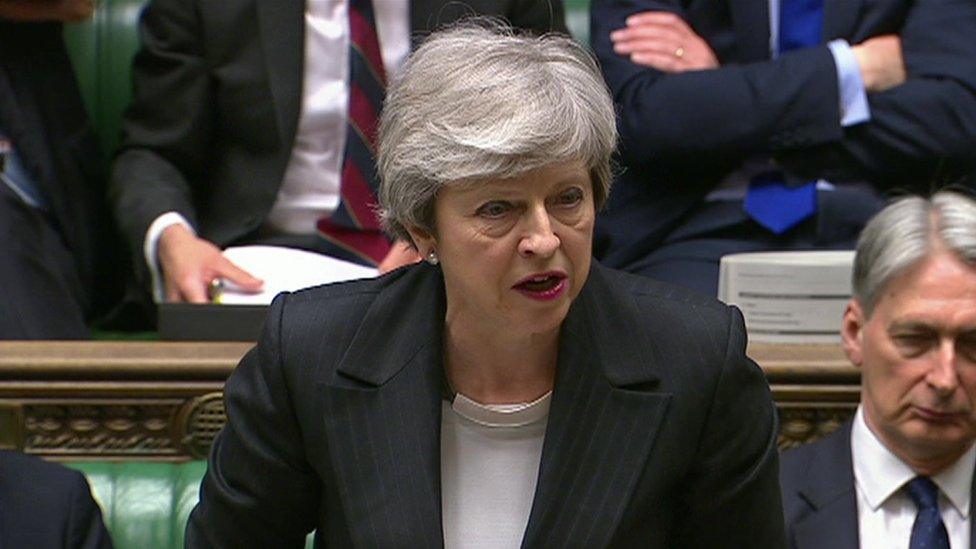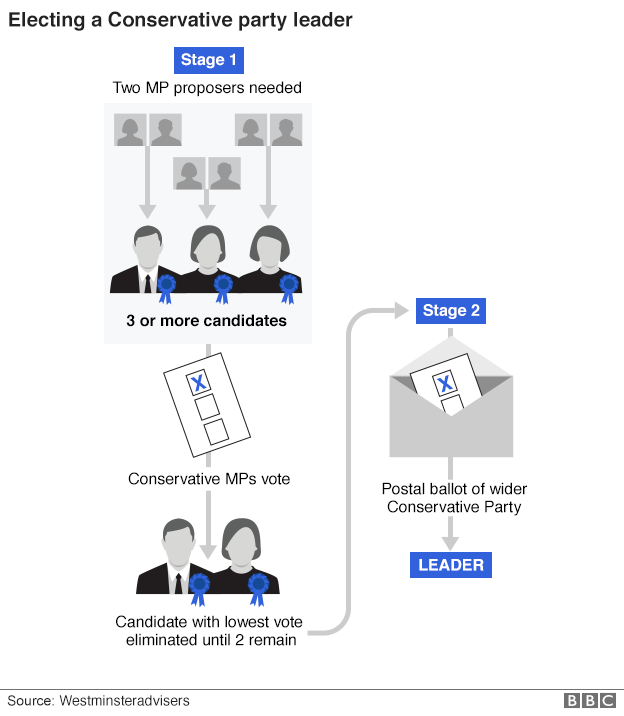Brexit: Theresa May resists calls from MPs to resign
- Published
- comments

The prime minister is resisting calls to resign despite a growing backlash against her Brexit plan from Conservative MPs.
Several cabinet ministers told the BBC that she cannot stay, with one saying it is "the end of the line".
Tory backbenchers met on Wednesday evening, but decided not to change rules which would have allowed an immediate vote of no confidence in her.
The BBC's political editor says the PM seems to have bought herself 36 hours.
Mrs May will meet the chairman of the influential backbench 1922 Committee, Sir Graham Brady, on Friday.
In the meantime, the UK will vote on Thursday in European Parliament elections, with the Conservatives widely predicted to do very badly.
Allow X content?
This article contains content provided by X. We ask for your permission before anything is loaded, as they may be using cookies and other technologies. You may want to read X’s cookie policy, external and privacy policy, external before accepting. To view this content choose ‘accept and continue’.

Allow X content?
This article contains content provided by X. We ask for your permission before anything is loaded, as they may be using cookies and other technologies. You may want to read X’s cookie policy, external and privacy policy, external before accepting. To view this content choose ‘accept and continue’.

Discontent at Mrs May's leadership grew significantly after she set out plans for the Withdrawal Agreement Bill - the legislation needed to implement the agreement between the UK and EU on the terms of Brexit.
It included a number of concessions designed to attract cross-party support, including new guarantees on workers' rights, environmental protections and the Northern Irish border, as well a customs "compromise".
But Brexiteers in her own party reacted angrily to it, particularly a promise to give MPs a vote on another referendum if they backed the bill.
Mrs May insists it is Parliament's "last chance" to get Brexit done.
Several cabinet ministers broke cover on Wednesday afternoon to signal their unhappiness with the bill, among them Home Secretary Sajid Javid.
Allow X content?
This article contains content provided by X. We ask for your permission before anything is loaded, as they may be using cookies and other technologies. You may want to read X’s cookie policy, external and privacy policy, external before accepting. To view this content choose ‘accept and continue’.

Foreign Secretary Jeremy Hunt also requested a private meeting with the PM.
But Laura Kuenssberg said the PM declined to meet the ministers - both of whom are seen as possible contenders to be the next Conservative leader - and instead seemed determined to "tough it out".
Sources told the BBC the chief whip, Julian Smith, made it clear to backbench MPs that the prime minister was not resigning.
The 1922 Committee had been expected to vote on Wednesday evening on whether to change the party's rules to allow an immediate vote of no confidence in the prime minister.
Current rules dictate that as the PM survived such a vote in December, she cannot face another one for 12 months.
However, the vote on a rule change did not take place - and afterwards, some members expressed their discontent.
Allow X content?
This article contains content provided by X. We ask for your permission before anything is loaded, as they may be using cookies and other technologies. You may want to read X’s cookie policy, external and privacy policy, external before accepting. To view this content choose ‘accept and continue’.
The PM has already pledged to set a timetable for a new leader to take over after MPs vote on the Withdrawal Agreement Bill - in theory, on 7 June.
But calls for her to go sooner than that have begun to come from Conservatives who had, until now, stayed loyal.
Writing in the Financial Times, external, Tom Tugendhat said: "Leadership matters; it has been absent for too long," he said. "This can only change with a new prime minister."
Former minister Tim Loughton said it was "very sad", but it was time for her to go - another, Stephen Crabb, said there needs to be a new PM "within weeks".
More familiar critics also added to the clamour for her resignation.
Leading Brexiteer Steve Baker said it was "not personal" but about "the future of the country", and his party "needs to reassemble a governing coalition willing to take us out of the EU", under a new leader.


There have been doubts about Theresa May's leadership for many months.
She herself has more or less said she will resign next month.
But something different has happened today, the mood has really changed.
More and more Conservatives publicly are saying she has to quit as soon as possible.
Ministers have been saying to me privately she has now reached the end of line.
Number 10 is adamant, though, that nothing has really changed she will press on and still try and get her Brexit deal though.
But it feels the government is almost in breakdown.
And it's simply not clear at this moment they'll really be able to hang on.

The UK was meant to leave the EU on 29 March, but that has been pushed back to 31 October after the Commons rejected Mrs May's withdrawal deal with Brussels three times.
Attempts to find a cross-party compromise via formal talks broke down last week, and Labour leader Jeremy Corbyn has rejected Mrs May's attempts to win his MPs over with her Brexit withdrawal bill plan.
'Not a compromise'
Mr Corbyn said her "bold new deal" was really a "repackaged version" of her failed withdrawal agreement, adding: "No Labour MP can vote for a deal with the promise of a prime minister who only has days left in her job."
He said the issue of Brexit had been "dividing our society and poisoning our democracy", but claimed Mrs May's deal "does not represent a genuine compromise".
Addressing her critics in the Commons earlier, Mrs May said: "In time, another prime minister will be standing at this despatch box, but while I am here, I have a duty to be clear with the House about the facts.
"If we are going to deliver Brexit in this Parliament, we have to pass a Withdrawal Agreement Bill, and we will not do so without holding votes on the issues that have divided us the most," she said.
"In the end, our job in the House is to take decisions, not duck them."
'Has to stop'
The SNP's leader in Westminster Ian Blackford - who supports a further referendum to remain in the EU - said it was time for the prime minister to go, having "lost the trust of the public".
"This deal is dead," he added.
The DUP, which props up Mrs May's government, has also refused the vote for the bill.
Labour's Liz Kendall backed the call for a public vote, telling Mrs May she will not get enough support for her bill from opposition members without including a confirmatory ballot as part of the deal - rather than just offering a vote on whether to have one.
But Conservative MP Vicky Ford said: "We cannot continue to leave our country in this uncertainty. It has to stop. The whole House has to stop saying no to everything on the table just because it is not our favourite dish.
"If we vote for this bill we can move on and the discussion on the next stage can start."

What is in the Withdrawal Agreement Bill?
Theresa May says failure to back her deal risks "no Brexit at all"
Mrs May is bringing the Withdrawal Agreement Bill - legislation required to bring her agreement into UK law - to Parliament in early June.
In an attempt to win over MPs across the House, she announced the following concessions:
A guarantee of a Commons vote on whether to hold another referendum on the government's Brexit deal
A vote on different customs options, including a government proposal for a temporary customs union for goods - what Mrs May called a "customs compromise"
A legal obligation for the UK to "seek to conclude alternative arrangements" to replace the Northern Ireland backstop by the end of 2020
If the backstop does come into force, the bill would guarantee Northern Ireland remains aligned with the rest of the UK and remains in same customs territory
Legislation to ensure workers rights are "every bit as good, if not better" after Brexit - and guarantees of no dilution in environmental standards
A legal duty to seek changes to the political declaration on future relations with the EU

What are the Tory leadership rules?
